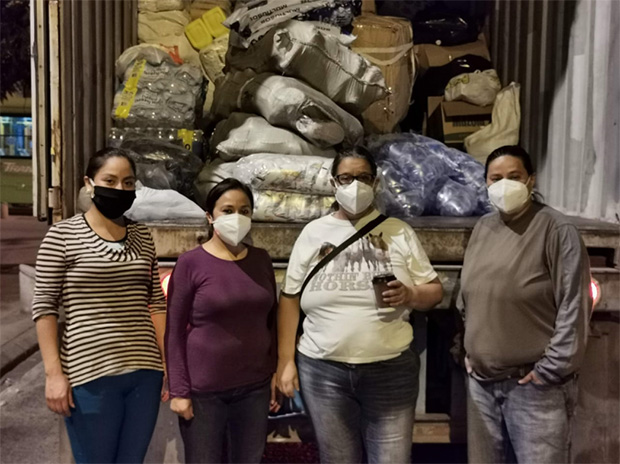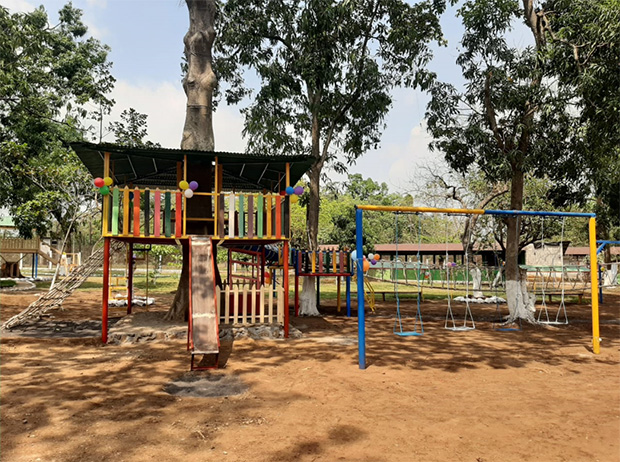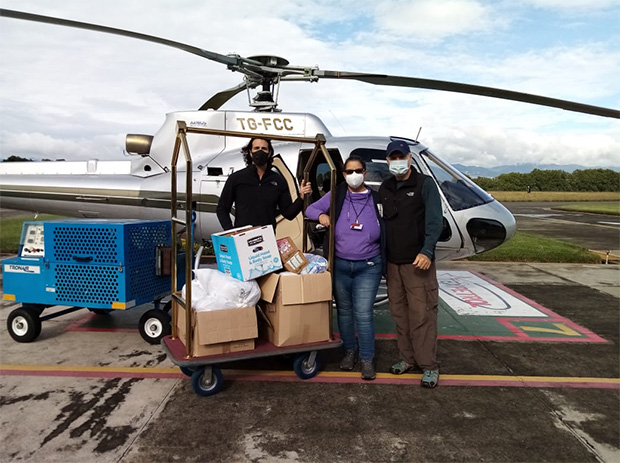
Andrea (second from right) and her volunteer team with the truck of supplies for prisoners’ families who were hit by Hurricanes Eta and Iota. Courtesy photo.
One afternoon in October, Andrea Barrios and her team of volunteers from CWS partner Colectivo Artesana knew they were being followed. They were in northeastern Guatemala, distributing supplies after Hurricanes Eta and Iota.
That night, someone tried to break into their hotel room, likely to rob them. The women were traveling with a truck of supplies–some funded by CWS–for families affected by the storms. Luckily, Andrea managed to lock the door before the robber could get in.
“It seems to me that the incident in the hotel, and others that affected our peers in the community, were because we are women in a context of sexism and machismo,” Andrea says. “We are ‘alone,’ with no man to supposedly take care of us.”
Andrea immediately reported the incident to the Ministry of the Interior and to CWS. The women considered their options (“Although we have the strength and capacity to help, we must consider the situations of insecurity that we face,” Andrea says) and decided to stay. Thankfully, they safely got the supplies into the hands of the families who needed them and then headed home.
But my conversation with Andrea that night, just hours after the attempted break-in, has stayed with me. I assumed that the group would cut their trip short and come home to Guatemala City. No, Andrea said. “We have a lot of work to do. We aren’t finished yet.”
There’s work to be done, and we can’t stop until we do it. Unfortunately, this is an attitude that Andrea and the Colectivo Artesana team have had to adopt over and over again as life has put hurdles in their way over the years.

A new child-friendly visitation area at a men’s prison in Guatemala, constructed through a partnership between Colectivo Artesana and the Penitentiary System. Photo courtesy of Colectivo Artesana.
What makes this group unique is that they work and support a group who people don’t seem to care about: women in prison, their children and their families. They are committed to helping them and others, since these families often face increased poverty and stress as a result. When someone who earns an income is arrested, it can leave their family scrambling to meet basic needs. Children can face trauma and stigma as a result of scary or violent arrests. Visiting a relative in prison can be a scary experience for a child, too.
Since most of Guatemala’s prisoners are men, the people outside the prison walls who can do this advocacy and humanitarian work–and who really understand what it’s like to have an incarcerated relative–are women.
Andrea and her team have spent years building relationships with prison directors and advocating for children with incarcerated parents, for women in prison and, lately, for men that are in that same situation. And they’ve had some major victories recently. Children with incarcerated parents now appear in two Guatemalan public policies, something that is not so common in any other country in the region. In response to COVID-19, and with help from CWS, Colectivo Artesana delivered cleaning supplies to women in prison and extra food for small children who live in prison with their mothers. They have also worked with men’s prisons to create child-friendly visitation areas to make children more comfortable when they visit.
And when the hurricanes hit in October, communities across Central America were devastated by the back-to-back major storms. Andrea knew that families of prisoners–who are often struggling financially to start with–would need a lot of help to recover.
So she got to work. “We were able to deliver 40 tons of aid between clothes, shoes, rubber boots, sheets, food, kitchen utensils, hygiene and cleaning supplies, mattresses and even temporary houses. People trusted us, thanks to the information, photographs and videos that we sent where they could see that aid was arriving by land, by air or by boat for affected communities,” she says.
“In response to Hurricanes Eta and Iota, it’s worth noting that all of our coordination and actions were driven mainly by women. This is possible because of the years of work that has united us,” Andrea says. “There is strength and experience in women reacting in an agile, responsible way and making sure aid reaches the greatest number of people.”
On International Women’s Day, we’re celebrating Andrea, her team, and the women like her around the world who won’t stop until the work is done. We can all learn from their grit.
Erwin Garzona is the CWS Regional Representative for Central America, based in Guatemala. Luciano Cadoni is the CWS Program Officer for the Rights of the Child, based in Argentina.

